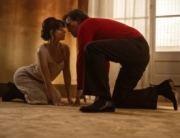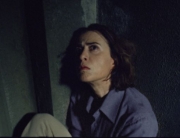It would be advisable to see at least one or two other films by Wong Kar-wai before seeing The Grandmaster. Or, to put it another way, if you are a hardcore martial-arts/kung fu movie fan and just want an ass-kicking good times and are curious about a new bio on the legendary 20th century martial arts master Ip Man, you may come out of this movie confused. What’s with all of the hyperactivity from the slow-to-regular-speed choreography in the fights? All of the existential dread and the malaise? (Ip Man’s other claim-to-fame was his martial arts instruction, and as the film’s title cards notes dutifully, he taught “his most famous student, Bruce Lee.” Two more movies about the man have come out in the years since Wong first announced this movie.)
The Grandmaster is the latest by Wong, whose films (In the Mood for Love, 2046) are mostly melancholy tales of lovers, or those who want to fall in love or have fallen out of it (or just yearn for love, which is what made Mood such a masterpiece). But the story? Yeah, how about some of that? Born to a wealthy family, Ip Man (Wong’s go-to male lead Tony Leung) is caught between the two factions of martial arts—the North and the South—as he tries to find some common ground to fight the Japanese, who have invaded China, and he becomes the heir apparent to Gong Yuitan (Wang Qingxiang) in the Wing Chung style. He has a foe in Gong Er (Ziyi Zhang, another Wong regular, and more beautiful than ever), who has to bring back pride for her family, which has been tarnished in the fights between North and South.
But the ongoing war in the early 1940s brings these generations-long rivalries to an end (at least for the moment), and afterwards, the impoverished Ip provides for his family by moving to Hong Kong to teach martial arts. The plot jumps ahead then to the 1950s–Wong isn’t exactly beholden to depicting all the decades with equal time–and the movie actually becomes not so much about Ip Man (not that he disappears exactly) but about Gong Er and her downward trajectory over time: Her family is disgraced, and like many in China after the war, she’s adrift.
Wong is interested in the storyline but only as a way of leading things along to the next set piece, to the next moment that he can orchestrate with French cinematographer Philippe Le Sourd in an act of dance as much as it is violence. The impact of the physical force is not so much softened but heightened with an otherworldly, dream-like view of it all. When Ip Man throws a punch, it almost vibrates throughout the audience. No wonder then that Martin Scorsese has so late in the game added his name to “present” the film.
The Grandmaster is fun to watch as far as the fights go. I wouldn’t recommend the film if it were just a slew of abstract-expressionist, painterly scenes. It’s still got the goods–watch just the trailer to get a taste, which is the opening sequence shot in the rain, where the sound design contributes to the visceral sensations. Throughout, the filmmaker pays great attention to color and music (oh, the music is VERY stylized, which is what distinguishes it the most as a movie by this director).
I should mention there are a lot of “feelings” in this film. (Leung and Zhang have near the end one too many longing looks.) But overall, it’s an emotional experience, and its best strength. But if there’s a nitpick it’s that, for whatever reason, for its American release parts of the story are sometimes over-explained or made a bit pat with intertitles. I can’t imagine that the director wouldn’t sign off on this release, and it has his stamp throughout, but a bit of the Weinstein Company goes a long way too. Perhaps the distributor wasn’t sure if a story about Ip Man would translate completely for mainstream U.S. audiences, but I am glad to see the plot’s more than the backdrop for what the director is after: the visual grace, grandeur, and heart of kung fu, which many films overlook.

















Leave A Comment